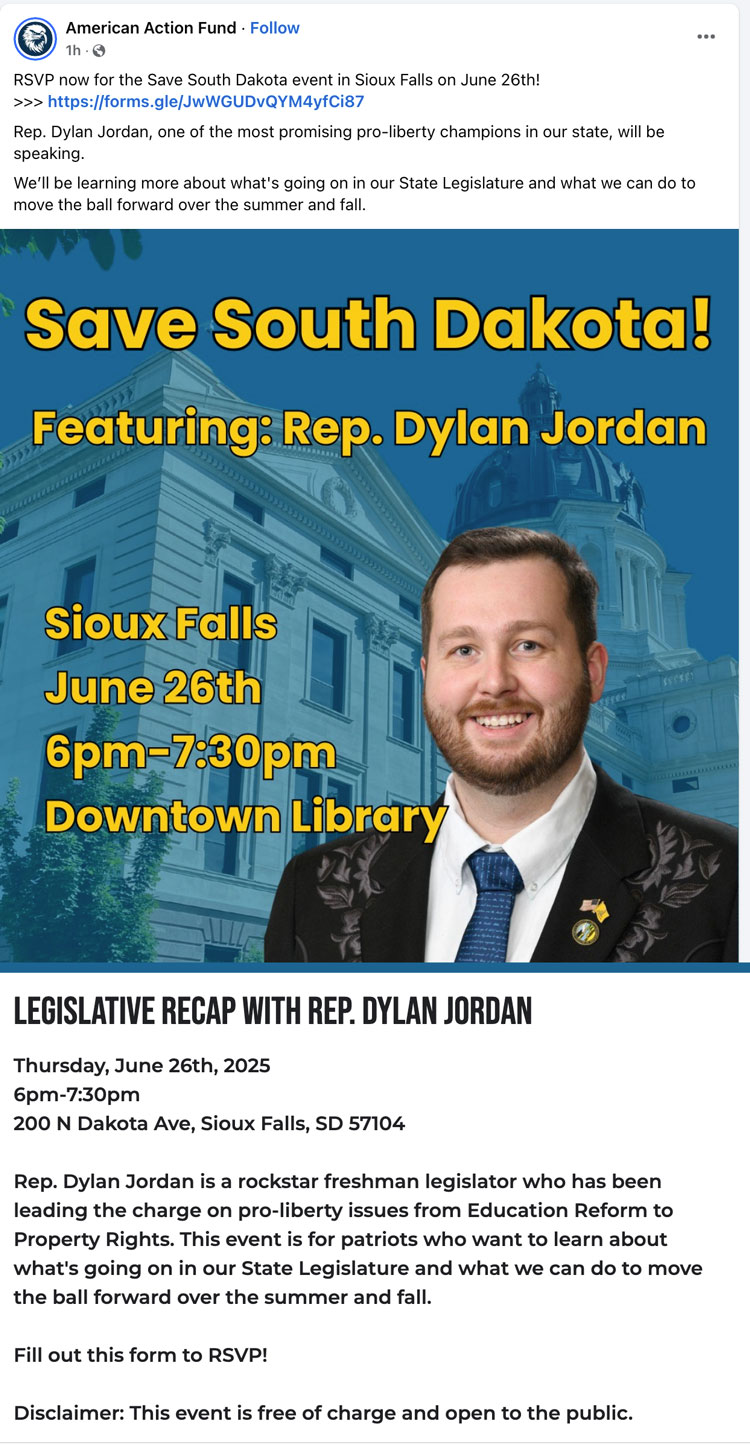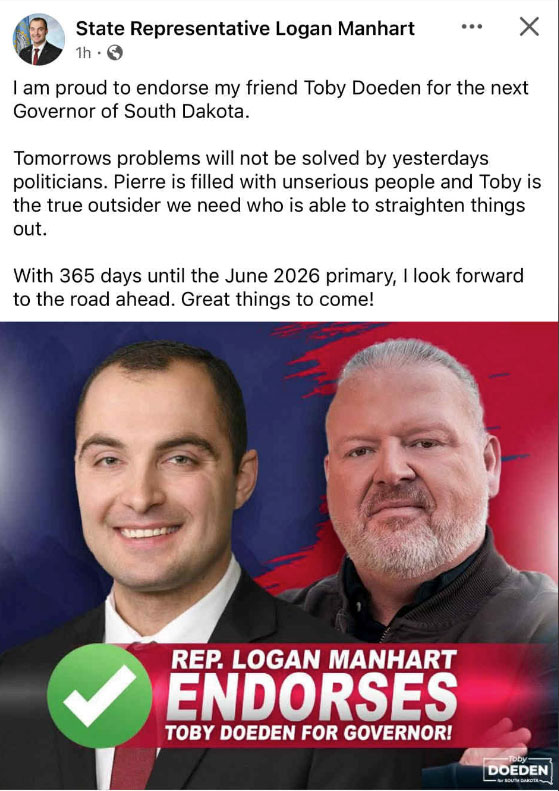Doeden for Governor claims will build “a legal wall” around South Dakota?
My head is starting to hurt from so much stupid.

I can’t wait to hear this explanation. Anyone on earth have any idea what “a legal wall” supposedly entails?
My head is starting to hurt from so much stupid.

I can’t wait to hear this explanation. Anyone on earth have any idea what “a legal wall” supposedly entails?
LOL. This is funny. Fox News Host Jesse Watters has advice for Democrats. You want to win elections? You need the Senator Thune workout plan.
State Rep. Dylan Jordan, whom his predecessor Fred Deutsch called “kooky, wrong and dangerous” is apparently speaking about something in an event sponsored by his lobbyist friend Anthony’s organization:

INTERIM RULES REVIEW COMMITTEE TO MEET
PIERRE – The Interim Rules Review Committee will meet Tuesday, June 10, 2025, at 10:00 a.m. (CT). The meeting is being conducted via electronic conference and in Room 414 of the State Capitol in Pierre, South Dakota, to allow for both remote and in-person participation.
The committee will review rules proposed by:
Those wishing to testify must register by 12:00 p.m. (CT) June 5, 2025, by email to Kelly.Thompson@sdlegislature.gov. Testifiers should provide their full names, whom they are representing, city of residence, which proposed rules they will be addressing, whether they are a proponent or opponent, and if they will be testifying remotely or in person. Only public testimony regarding the rules being presented will be accepted.
Committee members are Representative Jon Hansen (R-Dell Rapids), Chair; Senator Taffy Howard (R-Rapid City), Vice Chair; Representatives Roger DeGroot (R-Brookings) and Erik Muckey (D-Sioux Falls); and Senators Liz Larson (D-Sioux Falls) and Jim Mehlhaff (R-Pierre).
Hot off of my e-mail this AM, outgoing Sioux Falls Mayor Paul TenHaken has sent out a letter announcing what he anticipates the next chapter of his career will look like. While not directly stating what he’s going to be doing, he does specifically note “I do not intend to run for another public office at this time and look forward to seeking opportunities in the private sector.”:

Dear Friends,
It has been the honor of a lifetime to serve the people of Sioux Falls as Mayor since 2018. I am blessed by the outpouring of support from friends like you that have kept me charging ahead to make Sioux Falls an incredible place to live during my tenure.
During my seven years in the mayor’s chair, we have accomplished tremendous things. As Sioux Falls has grown by more than 30,000 new residents, we invested in infrastructure growth of roadways and a massive expansion of our wastewater system. While other cities moved to defund police, we expanded our ranks and built a state-of-the-art public safety training campus. Our administration brought together the city, businesses, and philanthropists to finish the Levitt, complete the State Theater, open The Link to serve those battling addiction, and build Jacobson Plaza at the Falls. Sioux Falls also proved its resilience through tough times as we overcame flooding, tornadoes, civil unrest, political tensions, and a pandemic. Through it all, Sioux Falls was named on of the 10 Best Run Cities in America this past year.
I am proud of the work we’ve done for Sioux Falls, but I am especially proud of the nearly 1,500 city employees as well as everyone we have collaborated with to improve the lives of the people who call Sioux Falls home. I’m also extremely grateful for the love and support of my family. Being mayor is a very demanding job, but it’s even tougher being the family of the mayor. I couldn’t do this without Jill and my great kids.
As I move into my final year in office, many are asking me what’s next. The words of encouragement have been humbling as I prepare to pass the baton to the next mayor. After prayerful thought and discussions with my family, I do not intend to run for another public office at this time and look forward to seeking opportunities in the private sector.
This does not mean I am walking away from politics. I will certainly stay engaged to help make sure South Dakota elects pragmatic leaders to local and state offices with servant hearts and the best interests of South Dakotans as their priority.
Again, thank you for your support over the years. It has meant the world to me and my family. We’ve got a lot of work to get done in Sioux Falls as we run through the tape in this final year together!
Blessings,
Paul
Mayor TenHaken does note in the letter that he plans to “stay engaged to help make sure South Dakota elects pragmatic leaders to local and state offices with servant hearts and the best interests of South Dakotans as their priority.”
So I’m guessing he’ll be supporting whomever runs against Bethany Soye?
According to social media and many, many mourners, Casey Wilson, a leader in South Dakota’s shared parenting movement lost his life yesterday in an automobile accident.
Casey, who helped organize efforts on social media for the shared parenting movement, as well as led the “Kids Need Both Parents PAC” was one of the most active and visible leaders of the movement to change the traditional custody arrangements in case of divorce to recognize greater rights for non-custodial parents. Wilson was also part of local country music duo “The Barn Flies” along with his wife Carleen Wild Wilson, featuring Carleen as vocalist and Casey on guitar which has enjoyed a popular following in the state. The group had been scheduled to play at Leavitt at the Falls in Sioux Falls this weekend. Casey was well known as an area farrier and former PRCA Team Roper.
Please keep Carleen and his children in your thoughts.
Gov. Rhoden Establishes the Governor’s Resilience and Infrastructure Task Force
PIERRE, S.D. – Today, Governor Larry Rhoden signed Executive Order 2025-06, which establishes the Governor’s Resilience and Infrastructure Task Force (GRIT).
“I am committed to keeping South Dakota strong, safe, and free for generations to come,” said Governor Larry Rhoden. “We pray that the most challenging circumstances will never arise, but we are preparing so that South Dakota can face such situations with determination, resilience, and grit.”
The GRIT task force will serve as a strategic advisory body to develop policy recommendations, assess risks and vulnerabilities, and support long-term planning and investment in critical infrastructure systems across our state.
The GRIT task force will include the following members appointed by the Governor:
The task force will be chaired by Lieutenant Governor Tony Venhuizen, and Adjutant General Mark Morrell will serve as vice chair.
“The GRIT task force is a proactive step forward to ensure that our state is equipped with strong infrastructure systems that can weather even the most turbulent of times,” said Lt. Governor Tony Venhuizen. “I am honored by Governor Rhoden’s appointment, and I look forward to working with General Morrell to lead this crucial effort.”
“I am grateful for Governor Rhoden’s leadership and proactive decision to strengthen our critical infrastructure systems,” said Adjutant General Mark Morrell. “Protecting the people of South Dakota is of utmost importance, and due to the sensitive and secure nature of GRIT, prudent thought will be given to the details we are able to share with the public.”
This task force supports President Trump’s Executive Order 14239, “Achieving Efficiency Through State and Local Preparedness,” which empowers state and local governments to play a more active role in national resilience and preparedness.
###
 Looks like Toby Doeden is doing all he can to promote legislators supporting him for Governor.
Looks like Toby Doeden is doing all he can to promote legislators supporting him for Governor.
First it was Taffy, now it appears that Logan Manhart is diving in:

And on Social Media today, Toby is doing his best to promote more association with his campaign by posting pictures of other legislators who were at his announcement enthusiastically supporting him..
Such as Senator “California” Carley…

Senator Carl Perry..

And Rep. Brandei Schaefbauer.

Speaking of State Rep. Brandei Schaefbauer diving in the Doeden dumpster, her ties to Doeden are particularly interesting, as she’s a House Majority Whip under Doeden’s only other announced competitor(s) at the moment, House Speaker Jon Hansen and Assistant Speaker Karla Lems.
While she’s serving in House Leadership, where almost all members of GOP House Leadership have pledged fealty to Hansen, she comes with a close association with Doeden, having previously donated to his PAC. And she invoked his name directly on the House Floor to defend him when Brandei tried to claim a campaign finance clean-up bill (which limited the amount of money that could be “loaned” to a campaign) was actually a personal attack on Toby Doeden:
Bonus association between Schefbauer and Doeden – here’s a factoid from public records that has not been mentioned before. According to the Secretary of State records, Rep. Schaefbauer’s current voting address is an apartment/townhome in the complex at 1915 10TH AVE SE in Aberdeen, owned by Plaza Rentals, LLP.
And who owns Plaza Rentals, LLP?

Of course. Toby Doeden owns Plaza Rentals where Rep. Schaefbauer lives.
And apparently he also owns Rep. Schaefbauer’s loyalty as well. I mean, she’s the one holding the sign claiming that Doeden is for the people, not the powerful.
As she campaigns for her landlord.
Hot from my mailbox, it appears that the re-study the state felt they needed to do on resolving South Dakota’s prison issue pointed them back to the beginning, and at the Lincoln County site they’ve already dumped $50 million into site prep for:
250530 SD Men’S_MP Refresh_ Updated Report by Pat Powers on Scribd
“Site Recommendations:
Based on our site analysis and choosing by advantages method of ranking potential sites the top ranked site for Development is the Existing Lincoln County SDDOC site. This site is 10 miles from Sioux Falls, is not in proximity to major interstates, railroads, or major waterways, has the size for a full build of 1728 in phase 1 (also can service phase 4&5 or phase 6 alt), is ranked high for site access, and only scored poorly for site utilities and potential additional cost during development. Due to the fact that the State already owns this land some of the total development costs are minimized compared to other sites that require purchase and development costs.
Lincoln County was followed on the ranking system by the Huron site, which also scored well, but is very remote and directly adjacent to a major highway.
Our recommendation for site selection for phase 1 development of the men’s capacity plan is the Lincoln County Site “
Of course, this will just be that much more expensive now that they’ve delayed and fiddled around with it as long as they have.
Attorney General Jackley Announces Discovery of Human Remains Likely of Hot Springs Man Missing Since 2024
PIERRE, S.D. – South Dakota Attorney General Marty Jackley announces that a search conducted in Fall River County has led to the discovery of human remains which are thought to be those of Matthew Marshall of Hot Springs who disappeared from that area in July 2024.
“While positive identification is still pending, the discovery of personal belongings in the area indicate it is likely Matthew,” said Attorney General Jackley. “Thank you to all of the searchers who have worked for almost a year to bring closure for his family.”
Marshall, 28, was last seen on July 24, 2024 in Hot Springs. He was reported missing by his family Aug. 4, 2024. Multiple searches have been conducted by local law enforcement and partner agencies during the last 10 months.
The human remains were found May 29, 2025 by Custer County Search and Rescue. Attorney General Jackley said the death investigation is on-going but does not appear to be foul play.
Agencies involved in the search were the South Dakota Division of Criminal Investigation (DCI), the Attorney General’s Murdered and Missing Indigenous Persons Program (MMIP), Hot Springs Police Department, Fall River County Sheriff’s Office, Custer County Search and Rescue, and BIA Missing Murdered Unit.
Those agencies that assisted were South Dakota Wing Civil Air Patrol, Oglala Lakota County Emergency Management, Mako Sica K9 Search and Rescue, and Medicine Wheel Riders.
-30-